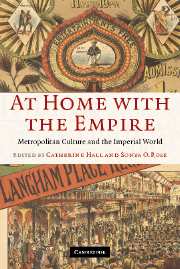Book contents
- Frontmatter
- Contents
- Notes on contributors
- 1 Introduction: being at home with the Empire
- 2 At home with history Macaulay and the History of England
- 3 A homogeneous society? Britain's internal ‘others’, 1800–present
- 4 At home with the Empire: the example of Ireland
- 5 The condition of women, women's writing and the Empire in nineteenth-century Britain
- 6 Sexuality and empire
- 7 Religion and empire at home
- 8 Metropolitan desires and colonial connections: reflections on consumption and empire
- 9 Imagining empire: history, fantasy and literature
- 10 New narratives of imperial politics in the nineteenth century
- 11 Bringing the Empire home: women activists in imperial Britain, 1790s–1930s
- 12 Taking class notes on empire
- 13 Citizenship and empire, 1867–1928
- Select bibliography
- Index
3 - A homogeneous society? Britain's internal ‘others’, 1800–present
Published online by Cambridge University Press: 11 April 2011
- Frontmatter
- Contents
- Notes on contributors
- 1 Introduction: being at home with the Empire
- 2 At home with history Macaulay and the History of England
- 3 A homogeneous society? Britain's internal ‘others’, 1800–present
- 4 At home with the Empire: the example of Ireland
- 5 The condition of women, women's writing and the Empire in nineteenth-century Britain
- 6 Sexuality and empire
- 7 Religion and empire at home
- 8 Metropolitan desires and colonial connections: reflections on consumption and empire
- 9 Imagining empire: history, fantasy and literature
- 10 New narratives of imperial politics in the nineteenth century
- 11 Bringing the Empire home: women activists in imperial Britain, 1790s–1930s
- 12 Taking class notes on empire
- 13 Citizenship and empire, 1867–1928
- Select bibliography
- Index
Summary
Popular belief and oral tradition treat British cultural and racial diversity as unprecedented and disturbing, blaming recent migrants for disrupting a previously homogeneous, thus harmonious society. Yet the history of prior migration from elsewhere in the British Empire and outside it shows Britain was never a monolithic, closed society, detached from global flows of population or cultural influence. While other chapters of this volume treat class, gender and other power relations, this essay argues that British and European empire building, among other structural shifts and historical contingencies, rendered different ‘internal others’ visible and apparently problematical at various times over the past two centuries.
Grandchild of migrants, common to my generation, I grew up hearing their stories: a child orphaned in a war zone, a dispossessed farmer, a draft-dodger, childbirth at sea, the random but systemic cruelties of a strange land. Drawn to study British race and migration by its distorted echoes of the familiar, I remain uneasy with scholarship that fails to acknowledge the lives ‘othering’ obscures.
Successive waves of conquerors, invaders and migrants comprised the British people, starting with the Romans, Anglo-Saxons, Danes and Normans. The subsequent millennium saw flows of Flemish weavers and Lombard bankers, religious refugees such as Huguenots in the seventeenth century and European Jews in the nineteenth and twentieth, and many others. Simultaneously, the British Isles sent forth millions who colonised for Britain the Americas, the Antipodes, Africa and Asia.
- Type
- Chapter
- Information
- At Home with the EmpireMetropolitan Culture and the Imperial World, pp. 53 - 76Publisher: Cambridge University PressPrint publication year: 2006
- 13
- Cited by



